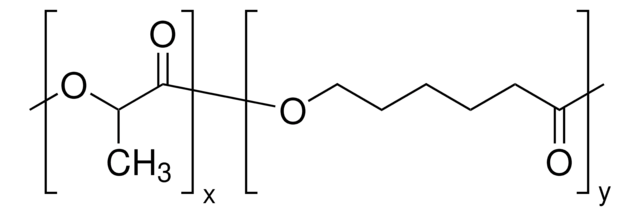906840
Poly(L-lactide-co-caprolactone)
lactide:caprolactone 90:10, viscosity 1.7 dL/g
Synonym(s):
PCL-PLLA, PLLA-PCL
Sign Into View Organizational & Contract Pricing
All Photos(1)
About This Item
Linear Formula:
CH3(C6H10O2)m(C6H8O4)nCH3
UNSPSC Code:
12162002
Recommended Products
form
chunks
feed ratio
lactide:caprolactone 90:10
color
white to off-white
viscosity
1.7 dL/g
storage temp.
−20°C
Looking for similar products? Visit Product Comparison Guide
General description
Poly(L-lactide-co-caprolactone) (PCL-PLLA) is a biodegradable polymer which can be synthesized by bulk ring-opening copolymerization of L-lactide and ε-caprolactone. Its properties include flexibility, biocompatibility and controlled degradation process.
Application
PCL-PLLA can be used for a variety of applications such as tissue engineering, bone fixation devices and surgical sutures.
Poly(L-lactide-co-caprolactone) (PLLA-PCL) is a biodegradable copolymer. poly(L-lactide) exhibits a high modulus and has been often copolymerized with PCL to improve the mechanical properties of PCL, and increase degradation rate of the resulting polymer. PLLA-PCL has been used in tissue engineering, 3D bioprinting and drug delivery research applications.
Storage Class Code
13 - Non Combustible Solids
WGK
WGK 3
Flash Point(F)
Not applicable
Flash Point(C)
Not applicable
Certificates of Analysis (COA)
Search for Certificates of Analysis (COA) by entering the products Lot/Batch Number. Lot and Batch Numbers can be found on a product’s label following the words ‘Lot’ or ‘Batch’.
Already Own This Product?
Find documentation for the products that you have recently purchased in the Document Library.
Preparation of a poly (L-lactide-co-caprolactone) copolymer using a novel tin (II) alkoxide initiator and its fiber processing for potential use as an absorbable monofilament surgical suture
Ruengdechawiwat S, et al.
International Journal of Polymeric Materials and Polymeric Biomaterials, 65(6), 277-284 (2016)
Application of a bilayer tubular scaffold based on electrospun poly (L-lactide-co-caprolactone)/collagen fibers and yarns for tracheal tissue engineering
Wu T, et al.
Journal of materials chemistry. B, 5(1), 139-150 (2017)
Preclinical animal study and human clinical trial data of co-electrospun poly (L-lactide-co-caprolactone) and fibrinogen mesh for anterior pelvic floor reconstruction
Wu X, et al.
International journal of nanomedicine, 11(6), 389-389 (2016)
Comparison of plasma and chemical modifications of poly-L-lactide-co-caprolactone scaffolds for heparin conjugation
Hsieh Y, et al.
Bio-medical materials and engineering, 12(6), 065004-065004 (2017)
Fabrication and characterization of vitamin B5 loaded poly (l-lactide-co-caprolactone)/silk fiber aligned electrospun nanofibers for schwann cell proliferation
Bhutto MA, et al.
Colloids and Surfaces. B, Biointerfaces, 144(6), 108-117 (2016)
Our team of scientists has experience in all areas of research including Life Science, Material Science, Chemical Synthesis, Chromatography, Analytical and many others.
Contact Technical Service





